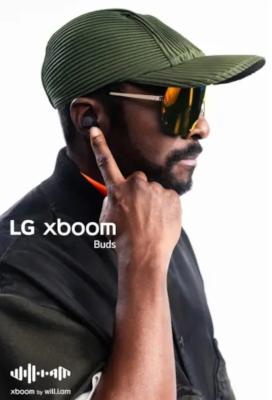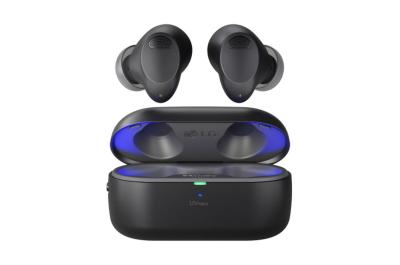![]() LG Corporation, based in South Korea, is a multinational conglomerate corporation that is involved with electronics, displays (LCD, plasma and OLEDs), telecom, chemicals and more.
LG Corporation, based in South Korea, is a multinational conglomerate corporation that is involved with electronics, displays (LCD, plasma and OLEDs), telecom, chemicals and more.
LG has an active graphene research and has filed for many graphene patents. According to our information, LG Electronics is offering CVD graphene sheets using its proprietary roll-to-roll production process. In addition LG Electronics uses graphene in some of its products.
128, Yeoui-daero
Seoul
South Korea
LG unveils “xboom by will.i.am” product line, that includes graphene-enhanced earbuds, at CES
LG Electronics (LG) has unveiled its new “xboom by will.i.am” audio product line of Bluetooth speakers and earbuds at CES 2025, created in partnership with musician and tech entrepreneur, will.i.am.
The xboom Buds employ lightweight graphene drivers, which are key to delivering pure, well-balanced sound with rich bass. Graphene is said to improve durability while supporting LG’s Active Noise Canceling technology, providing a more immersive listening experience. Featuring LE Audio Auracast, the Buds enable users to listen to open audio streams in public and permit multiple device connections so that several users can simultaneously enjoy the same audio. Designed for comfort and stability, the ergonomic ear tips adapt to various ear shapes, while the unique ear hook design provides a snug and stable fit on the go. It offers up to 30 hours of listening time with the support of its charging case, as well as IPX4 water resistance that protects against splashing water.
LG Electronics launches new TONE Free Wireless Earbuds with 'pure graphene'
LG Electronics (LG) has launched its latest TONE Free T90S model to the global market, designed to offer improved sound for a heightened listening experience. LG stated that its new T90S earbuds are 'enhanced by pure graphene'.
Delivering an enriched audio experience with improved accuracy and clarity, the newest T90S earbuds use pure graphene for drivers, a departure from the conventional use of coated graphene. The use of pure graphene in LG’s latest earbuds reportedly reduces vibrations and allows users to revel in well-balanced and precise sound with powerful bass and enhanced mid- and high-range frequencies. The T90S earbuds are designed to take full advantage of graphene’s lightweight nature, ensuring a cozy fit that ensures comfort for prolonged listening.
LG Electronics to start offering CVD graphene materials
According to our information, LG Electronics is aiming to start supplying CVD graphene materials worldwide soon, with an aim to accelerate the adoption of CVD graphene in various applications. LG is collaborating with research groups to identify new applications for graphene sheets.

LG Electronics developed its own roll-to-roll production process in addition to a specific quality control system for its graphene. LG says that its inspection system can manage uniformity deviations in crystal size, defects and electrical properties in its graphene to within 10%.
LG Chem launches a battery technology challenge
LG Chem has announced a Battery Challenge - a startup innovation competition designed to accelerate the adoption of new battery technologies, business models and ideas around the world. While not focused solely on graphene battery technologies, this competition could be a wonderful opportunity for companies to showcase and promote their graphene-based battery products and ideas.
LG Chem is offering up to $2 million in cash prizes and investment opportunities with a demo day in Silicon Valley and a sponsored week-long trip to South Korea to visit their HQ and facilities. LG Chem is interested in partnering with startups/teams working on new materials, management and control, innovative cell design, manufacturing processes and more.
LG files a patent for graphene microwaves
A newly published patent filing from LG reveals the specifications for a next-gen microwave oven that includes a graphene door to prevent the radiation inside from leaking out, ensuring more uniform heating. While the microwave itself sounds interesting, it seems that the manufacturing process, which follows a special layering approach, is the real innovation.

The process begins when a catalyst metal with microwave shielding properties such as copper is sandwiched between two layers of graphene synthesized by CVD. Next, a number of support materials are added to the structure in order to support the subsequent etching phases, which pattern the individual layers in a way that exposes both the graphene absorbent and the catalyst metal with its shielding properties for double effect.
Graphene-based membrane can be a thousand fold more breathable than Goretex
Researchers from ETH Zurich and LG Electronics developed a stable porous membrane made from only 2 layers of graphene. They say that this is the thinnest possible porous membrane that is technologically possible to make.

The new membrane can be used as a filter for several different purposes - such as waterproof clothing. In fact the researchers say that their membrane will be a thousand fold more breathable than Goretex! Other applications may include water filteration and gas and liquid flow rate measurements.
Korean companies are securing essential graphene patents in Korea
The Korean Intellectual Property Office posted some interesting figures today. They report that Korean companies are securing essential patents related to the commercialization of graphene - and several companies are making inroads into graphene production and manufacturing transparent graphene-based displays.

Between 2005 and June 2013 a total of 2,921 graphene-related patents have been applied for in Korea, and the rate is accelerating quickly. 93% of those patents have been applied for by Korean individuals and organizations.
Korea to allocate $40 million towards local graphene commercialization in the next six years
South Korea is planning to spend around 47 billion won ($40 million) in the next six years on graphene technologies. The Korean government (or specifically the Ministry of Trade, Industry and Energy, MOTIE) wants to help local companies to commercialize graphene, and more than half of the investments will be given to small businesses.
Korea is ranking third in the world by number of graphene patents. Samsung is the company that holds the largest amount of graphene patents in the world, while Korea's Sungkyunkwan University is the world's leading research institute (if we rank by graphene patents, again).
Lomiko Metals sees a large graphene market ahead, says Graphene Labs already sold to over 4,000 customers including Ford, Samsung, LG and Sony
 Graphene Laboratories recently signed a two-year strategic alliance agreement with Canada's Lomiko Metals, the owner of several resource properties containing high-grade graphite. Graphite Investor News posted an interesting interview with Lomiko Metals' CEO, A. Paul Gill.
Graphene Laboratories recently signed a two-year strategic alliance agreement with Canada's Lomiko Metals, the owner of several resource properties containing high-grade graphite. Graphite Investor News posted an interesting interview with Lomiko Metals' CEO, A. Paul Gill.
Mr. Gill says that he sees a "huge market" for graphene, as billions of dollars have already been spent on research and development. Gill says that Graphene Labs alone have sold graphene products to over 4,000 customers, including Ford, Sony, Samsung, LG, the US Army and NASA.

